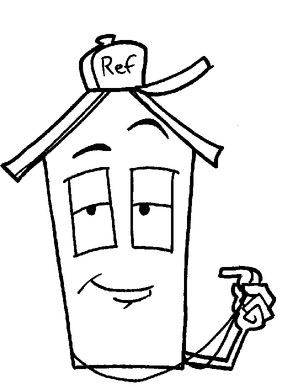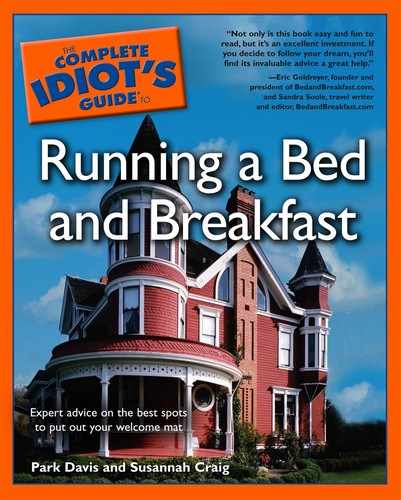
Chapter 6
Legalities and Liabilities
In This Chapter
• Complying with the basic requirements of your state and local district
• Protecting yourself from property loss and becoming a good risk
• Finding the right insurance coverage
Every state, county, city, and town will differ when it comes to rules and regulations that govern such issues as zoning, licensing, and safety. If you happen to be the first B&B in your town, prepare to lay some heavy groundwork. There might not be many existing regulations for them, so town officials will watch you carefully and probably will use your business as a model for B&B regulations to come. If there are other B&Bs already operating in your area, you’ll be expected to follow the rules and regulations that are in place.
The best way to head off surprises (what do you mean I can’t build a back cottage?) is to do your homework. Find out about the zoning guidelines for the property, fire code and health regulations, and what licenses and permits you’ll need. There also are state regulations to be fulfilled. The feds are primarily concerned with getting a chunk of your cash flow and making sure you file your taxes correctly (covered in Chapter 9, “Setting Up Your Business and Financial Structure”).
Space does not allow us to provide more than a set of guidelines for dealing with typical rules and regulations, many of which might apply in your area. To get the scoop on regulations that will affect you, talk to your building department; ask your attorney, business manager (if you’ve hired one), or real estate agent (if the agent is wise in the ways of regulations); and talk with other local B&B owners.
Rules of the Locals
These days, town officials are less likely to be baffled by a proposal for a B&B than they used to be, thanks to a positive turn in the industry’s growth. Even now, though, B&Bs remain something of an oddity; not a restaurant (in most cases), not a boarding house, and not a hotel. Your business will exist in a kind of regulation limbo at times. Official processes might take longer because officials might not know exactly how to classify your establishment. Consequently, they might impose very strict parameters to ensure that all bases are covered; or they could go in the opposite direction and your B&B’s regulation could be looser than you expected.

Coffee Talk
Here are some tips about buying seaside property from owners/inn-keepers Rick and Ruth-Anne Broad of Anne’s Oceanfront Hideaway B&B in Salt Spring Island, B.C., Canada. “Oceanfront is a very dear commodity in most areas of the west coast. Look into things like set backs and watershed areas before you buy, and decide if it fits both your budget and your plans. For example, you probably won’t want a high bank, steep cliff waterfront if you’re going to welcome children. If you’re going to be wheelchair accessible you won’t want steep access or a lot of stairs. We had a few minor difficulties getting our plans approved as this is a very conservation-minded area and they needed assurance we weren’t building a ‘mini hotel.’”
Naturally, you’ll view your B&B as a positive addition to your local economy and your community, and some officials will agree with you. Others will need some convincing, and oddly enough, those who appear guarded at first sometimes can become your biggest supporters. They’re the people who really want to do what’s right for the town, and they’ll pay attention to your proposal. So be prepared for the fact that your positive perspective on your B&B might not immediately be shared by everyone, and there probably will be a few who will never come around. Don’t get discouraged; keep in mind that it’s the job of the town officials to weed out the very bad ideas (Stan’s Fire Breathing School for Kids) from the very good ones (your B&B).
There are a lot of politics involved in getting a business started. If you’re new to the town, you’ll have more ground to cover because you’ll want to meet and talk to as many VIPs as possible. If you’re a long-time resident, talk to town officials you know and find out which way the political wind is blowing. In either case, try to garner as much support as you can from those in decision-making positions. At the very least, make your presence known and get to know how things work in the town. Attend board meetings that might affect you or your property. Hire a respected architect and contractors, those with a proven track record with other local businesses. Establish yourself and gain the respect of the movers and shakers before you need their support.
Local Regulations
Most of your red tape will occur on the local level. Make sure you find out the protocol for procedures and the requirements in your municipality before you start the process of establishing your B&B.
Getting Legal
Depending on your town, you may or may not need to obtain every type of license and permit that exists for a small business. However, if having proper approval to conduct business will make your B&B stand out as a full-fledged and professional operation, it’s worth the fees. Chances are you’ll have to apply for one or more of the following types of local documentation to start up your business:
• Business license. Most towns require a license to conduct business. You can apply for one at the town hall (some areas have a department for licenses) and, once licensed, you will receive a certificate to frame on your wall. You also will be charged an annual fee for renewal of the license and your B&B will have to be inspected annually. This can include health inspections if you have a pool, hot tub, full-service kitchen, or bar. There also might be inspections by an electrical inspector from the fire department to test smoke alarms and make sure fire extinguishers are in place; and a building inspector who will ensure that exits aren’t blocked and that your general maintenance and upkeep is acceptable (no broken boards, and so on). If the inspectors find anything amiss, most likely they will require you to fix the problem and be inspected again before they’ll sign off on renewal.
• Building permits. If you’re constructing a B&B from scratch, you plan on major additions, or even if you build a fence, you’ll need to file for a building permit. Each permit involves a fee. Before you head down to the town hall, call to find out what documentation you’ll need for a casual meeting with the member or members of the building department. You’ll likely need to leave copies of blueprints or plans with them for review. Your property might need to be inspected, and planning or zoning committees also might need to review your plans before a permit is issued. Issuing building permits enables towns to keep an eye on property improvements and to reassess them accordingly during tax time. Most areas don’t require a permit for fixing an existing structure but it really depends on your level of reconstruction and the structure of the town’s codes. If you buy from a respected real estate agent with commercial real estate knowledge, much of the licensing and registration legwork should have been done by your agent. If you don’t buy through an agent—or even if you do—hire a real estate lawyer to follow through on the legalities.
with the member or members of the building department. You’ll likely need to leave copies of blueprints or plans with them for review. Your property might need to be inspected, and planning or zoning committees also might need to review your plans before a permit is issued. Issuing building permits enables towns to keep an eye on property improvements and to reassess them accordingly during tax time. Most areas don’t require a permit for fixing an existing structure but it really depends on your level of reconstruction and the structure of the town’s codes. If you buy from a respected real estate agent with commercial real estate knowledge, much of the licensing and registration legwork should have been done by your agent. If you don’t buy through an agent—or even if you do—hire a real estate lawyer to follow through on the legalities.

Inn the Know
If you plan to purchase a turnkey B&B, do some research on licenses and permits held by the current owners. As is the case for some liquor license rules, you might need to renew the license in your name or apply for a new one.
• Fictitious name. Why, surely you can’t mean that! Yes, we do, and don’t call us Shirley. When you register your business name you file for a “fictitious name” statement with the county clerk. It doesn’t mean that you register your business under a different name. Filing a fictitious name statement is for B&Bs that have a name separate from the owner’s given name (such as Hideaway Cove Inn). If you do use your own name for the business (“Sue Ellen’s B&B,” for example), you’re exempted from registering.

B&B-eware!
Don’t try to get away with constructing something without a building permit. It might cause some serious complications when you try to sell the place down the road because you won’t be allowed to get a certificate of occupancy, which you’ll need to convey a deed at sale of the property.
Filing for the fictitious name most likely will require you to have a notice of your application published in the newspaper for a set amount of time. You’ll be charged for filing the name and for the cost of publishing the notice. This procedure will alert the local world of its new prospect; you also might need it to open a business checking account, so be sure to save a clipping of the notice.
It’s a good idea to register your B&B’s name whether you’re required to or not. When you file, the county double-checks your name against other registered B&Bs to prevent duplication. Registering will save you from being taken to court by another B&B of the same name that wants to stop you from using it.
Get in the Zone
Your town’s appointed officials mapped out residential, commercial, and public areas because people don’t want to live next to a fast-food joint and fast-food joints want to be near other businesses. For this reason, there are restrictions on where you can have a B&B (although this gets tricky because most of the time it’s a business and a residence) and what it looks like from the street.
The town has the right to say no to you if the property resides in an area not zoned for B&B use. Getting approval from the zoning board means presenting your business plan, answering questions, and waiting for approval from the powers that be. It sounds simple but there can be even more steps added on, particularly if you need a building permit, which you can’t get because the building department still needs to inspect your property, and so on.

B&B-eware!
Think you can miss that zoning meeting when approval for construction on your B&B is on the table? Think again. Although your local zoning commission can vote yea or nay on any project whether you’re there or not, it only makes sense to show up. What if someone on the board has questions for you? What if half of the board wants to vote yea and the other nay; who will be there to persuade them? Don’t be intimidated by these meetings. Go, armed with enthusiasm and answers for all conceivable questions. Pay attention to the board’s concerns and dispel them with positive solutions.
In some towns, planning and zoning are combined into one commission; in others they’re separate. The more committees that need to approve your plans, the more meetings you’ll need to attend and the longer it will be before you can get your B&B started.
If an existing zoning bylaw is a stumbling block, it is possible to fight it (bylaws are covered later in the chapter). You can request a variance for your property or even the rezoning of an area. However, don’t rely on this option and think, “Oh, I can get them to change their minds.” It might not happen. Look at records of recent zoning board approvals and consider current town plans. You might have a solid case for your request if it conforms to plans for the future direction of the town or will break ground in an undeveloped area of the town plan. You could have town officials thinking that your proposal was their idea all along!
Some of the other procedures you might be required to go through involve …
• Public works requirements. The public works department is concerned with traffic and adequate access to buildings. Some public works departments are very strict about limiting the amount of off-street parking per guest room, the existence of a sidewalk, your curb cuts, and the width of your driveway. Check with public works before you buy a property that has no parking at all!
• Historical society or review boards. Some towns have boards that go beyond planning and zoning to manage changes in residential and commercial property. These boards will have guidelines on signage, fencing, house color, and consistency in architectural style. If your property is a historical landmark (or you think it should be considered one), it might need to be inspected and reviewed before it’s officially recognized as such.

B&B-eware!
Stop! Before you build that front porch, check to make sure that no one will make you tear it down. In historical districts, local historical and preservation societies ensure that properties keep up their old world charm. Sometimes you can fight the nit-picky stuff, but adding a porch that will change the look of the house will be a tough battle. There is a saving grace: Most preservation boards care only about changes that can be seen from the road.
In-House Safety Check
In a business catering to overnight guests, health and safety should be taken seriously—and it will be by your local fire marshal and health department.
• Fire codes. Some of the requirements you might encounter in your area to bring your building up to code are hard-wired smoke detectors with battery back-up, exit signs (possibly lighted), fire extinguishers in strategic areas, sprinklers (mostly required only with new construction or major renovation), legal exits, and fire doors. Your fire marshal should supply you with fire safety brochures, a must-have for any business. A fire code violation can result in fines if you don’t have it corrected, and could hold up your license renewal until the problem is fixed. Fire codes are becoming extremely stringent everywhere, especially with new construction and remodeling. Improvements to fire safety in an older building can be used as a bargaining point when you’re seeking zoning approval or variances. In more densely populated areas, additional benefits include lowering the risk of burning down the neighborhood, insurance breaks, and better sleep for you.
• Health department. These people make sure that your staff and your operation (primarily food service) are fit enough to serve the general public. Inspection by the health department is extremely important. If you fail, you might be able to operate (with a probationary time period to get your act together); but do yourself a favor: Save your reputation and get it right the first time. Health departments typically will check your kitchen and bathrooms for cracks in the walls (which allow unwanted pesky critters in); proper ventilation; and washable floor, wall, and ceiling surfaces. If you offer a full breakfast you might be required to purchase a convection oven and commercial dishwasher. Depending on your operation, you might even need to get a food handlers permit. You’ll also need to educate your staff on proper food handling and cleaning procedures. Check with your municipal or (if there isn’t one) county health department for specifics on their guidelines so you’ll be ready for an inspection. State health departments can be very rigid and have been known to make unexpected stops. Find out what your state and county guidelines are so you can be prepared.
Local Bylaws
Some communities will have detailed bylaws restricting what changes can and cannot be made to a B&B or to the property. Most of these regulations apply to small B&B and guesthouse operations existing in residential areas. Some municipalities have separate bylaws for inns and larger B&B businesses. Bylaws you might run into cover the following:
• Seeing signs. Restrictions on the size of signs and their height from the ground are common.
• Regulations on food service. Because most B&Bs are zoned in residential areas, you might not be allowed to serve any meals to nonguests, or might be restricted to serving only breakfast. The purpose of these restrictions is to prevent excessive noise and traffic in residential areas. Cooking facilities in guest rooms also might be prohibited.
• Owner-occupied rules. In some towns, to be classified as a B&B, you will need to live on the property. You might be able to circumvent this rule by hiring a live-in manager and notifying the town of his or her name.

Inn the Know
If you’re entertaining the idea of using your B&B for parties or weddings in the future, check to make sure it’s permitted. You might need to add extra parking or make other accommodations; things you’ll want to know about before renovating.
• Limits on guests and how long they stay. The number of guest rooms might be limited, as well as how long guests can stay. These restrictions are put in place to distinguish B&Bs from boarding houses and other rental units.
• Renovation considerations. Some towns will not allow renovations that would rule out restoring a house to its original use as a single-family residence (usually determined by the number of kitchens in the building). Once again, local codes come into play that might affect your renovation and the future sale of your B&B.
Local Taxes
You will be required to pay local property tax based on your purchase price and the annually reassessed value thereafter. Your municipality or your state also might charge rooms tax. If you sell things such as gift items you’ll need a separate permit for sales tax. For more on taxes and how to file, see Chapter 9.
Americans with Disabilities Act
If you operate a B&B with five guest rooms or fewer and live in the house, you are exempt from complying with the federal Americans with Disabilities Act (ADA). Old buildings are not exempt. If you buy a three-story inn, you will need to add an elevator (not required with one- or two-level buildings). ADA compliance may be required for making certain renovations (check out the ADA Web site for details).
Compliance with the ADA requires making provisions for those with physical disabilities, including the sight and hearing impaired.

Inn the Know
To find out more about what’s required to comply with the ADA, contact them directly at Office of the Americans with Disabilities Act, Civil Rights Division/Department of Justice, PO Box 66118, Washington, DC 20035; 202-514-0301 or 202-514-0383 (TDD). The ADA home page at the U.S. Department of Justice is www.usdoj.gov/crt/ada/adahom1.htm.
State Policies
Just as municipalities differ in their zoning, licensing, and regulatory requirements, so do the states. The following are some typical state requirements for B&Bs:
• Room tax permit. If you’re “selling” the use of rooms in your house, in other words operating a B&B, your room charges will be taxed by the state. You’ll need a room tax permit so that you can add this tax to your guest bills.
• Sales tax permit. If your state has sales tax and your property is zoned for selling products, most likely you’ll need to obtain a permit to collect sales tax on anything other than rooms that you sell to your guests. Talk to your accountant about the best way to keep track of sales tax and when to pay it (monthly, quarterly, or yearly). The more tourism your town has, the quicker you’ll be able to find out what’s required (from another local B&B, for example).
• State employer tax I.D. number. If you have employees, states also collect taxes in the form of an “unemployment insurance tax.” The state employment office will issue you an employer number automatically. You’ll need this at tax time when you report payroll.
• Worker’s compensation. This may be required, depending on state or local codes. See “Must-Have Coverage and Then Some,” later in this chapter.
• Liquor license. States require one if you serve hard stuff and beer and wine (some states have a separate beer and wine license, which is easier to get because they assume you’re serving food).
Getting Good Insurance
Having a solid homeowner policy is a start, but as you’ll find out when you talk to your lawyer and insurance agent, it’s not enough. Choosing insurance coverage carefully and wisely is your best protection. Find an agent that specializes in bed and breakfast coverage or is experienced in small businesses. There are a lot of good insurance packages for B&Bs now.
Becoming a Good Risk
Insurance companies want to have some insurance themselves. B&Bs that have good insurance policies (and with lower premiums) have taken steps to prevent liability. Here are some specific ways you can become a good risk:
• Get inspected. Even if they’re not required, building, fire code, and health inspections will prove to the insurance company that you’ve taken steps to protect your business. Ask your agent what you can provide for the insurance company (inspection reports, for example) to get good coverage at a lower premium.
• Prevent injuries. Buy some carbon dioxide detectors, heat sensors, and smoke alarms for every room (these will be required anyway). Heat sensors and smoke alarms are typically required to be hard-wired by an electrician, particularly if you do a major renovation. Putting fire extinguishers in each room is an excellent idea, especially if you have an older house, and they’re very affordable. Put handrails in bathtubs and showers, non-skid material under rugs, fix broken or loose steps, remove snow and use salt to melt ice on pathways, put baby gates at tops of stairs (if you accept young children), install emergency lights and motion lighting outside, and use double-bolt locks on all outside doors.
• Prevent liability. Before you offer services that can put guests in dangerous or precarious situations, such as offering use of your mopeds or picking up guests at the airport or train or bus station in your personal-use vehicle, talk to your agent to make sure you’re covered for personal injuries to your guests. You probably won’t be, and you’ll need to buy extra coverage or a really good umbrella policy. Also have guests who use mopeds, for example, sign a disclaimer (ask your agent about the language to use). Don’t feel bad about doing this—if they rented them somewhere else they’d have to sign a waiver anyway. But don’t rely on insurance or a disclaimer as your only means of protection: Make sure those mopeds, horses, or snowmobiles are safe for use in the first place!
• Train your staff. Teach your staff the proper way to lift heavy objects (from the legs, from the legs!), and how to practice safety in the kitchen and when operating machinery. Don’t expect them to be familiar with safety practices, even if they’ve worked at other B&Bs. If anything happens to an employee while on the job, Worker’s Compensation will cover their expenses, but your insurance rates will rise as a result. Plus, what happens if an employee causes injury to a guest by failing to practice safety? Most likely you—not the employee—will be sued. Not familiar with work safety practices? Contact the U.S. Department of Labor’s Occupational Safety and Health Administration at www.osha.gov for more information.
Protection from Loss
Your insurance company will require that you submit a list of all valuables and goods on the property. This list will help the company assess property value, and will be invaluable down the road if you need to make a claim of damage or theft. That way, if a guest burns down the entire floor, you’ll know how much the furniture and other items in room 6 were worth. Be sure to list everything and its true value. If you’re not sure what Grandma Betty’s tea set is really worth, get it appraised. Underestimating the monetary value of your personal and business property can only hurt you later on.

Coffee Talk
Kerry Adams of Fireside Insurance Company in Provincetown, Massachusetts, suggests that you take pictures of rooms and of extremely valuable items. You might even get your agent to do it. Keep your list and the pictures in a safety deposit box at the bank and send copies to your insurance agent. Save copies of receipts for newly purchased items and don’t forget to add the items to your list! If a fire wrecks the house, you might not remember everything that was lost. In a typical catch-22, insurance companies accept verification of loss only after a claim is made: Pictures can help establish that you had something, but you can prove that you had it only after it’s gone!
Must-Have Coverage and Then Some
There’s a lot of insurance coverage to be had in this business. The potential for something to go wrong is huge in any business and this especially holds true for B&Bs and their owners. The insurance game is all about getting the best deal for the most protection possible; but insurance coverage is something that you don’t want to skimp on. If you don’t pay for coverage now, you might pay a lot more in damages later on.

B&B-eware!
Do not operate your B&B without having full insurance coverage! Getting standard coverage during renovation or construction is well worth the money, too. What happens if the kid next door falls into your newly dug hole for the swimming pool? It’s a risk you can’t afford to take.
Coverage for the house and the business will split into two main parts: property and liability. Property insurance covers the house, everything in the house, and everything used to maintain it. Liability covers anything that could happen to someone while in your house or on your land. A package deal that includes property and liability insurance is your safety net.
Find a policy with broad coverage to protect against fire, theft, and weather damage. It’s not easy to get full weather damage (it depends on where you live) but get as much coverage as you can. One hailstorm can break windows and damage siding for good.
Getting “business interruption” coverage might save you if something major, such as a flood, stalls your business from operating. How would you pay the mortgage and other bills that will still be coming in? If you can prove a steady history of your income in the months before the catastrophe, this coverage will kick in and cover your lost revenue in case of a disaster.
Worker’s compensation coverage, even if it’s not required in your state, is a must. If your chef cuts off his or her thumb while slicing apples on your cutting board, you won’t have to pay the medical bills, physical therapy expenses, and lost wages. Worker’s comp also can cover life insurance. Unless an employee can show that an owner’s utter and extreme negligence caused an injury, you, the owner, will not be sued under this coverage. An owner might choose to be covered as an employee under worker’s comp, but it will cost more.
Some other insurance that you should consider adding to the list includes …
• Food spoilage. Especially if you are an inn or offer more than one meal, this is a good extra. During an extended power outage, you might lose a few hundred dollars in food, depending on what you have in your fridge and a separate freezer.
• Products coverage. If a guest gets food poisoning on your property and it is not your fault, but the fault of the producer of the tainted product, products coverage will protect you. This should be included in your basic coverage. 

Inn the Know
Some basic policies will allow only 8 or 10 “perils.” Typically, the basic eight perils are fire, lightning, windstorm, hail, aircraft, riot, vehicle explosion, and smoke. Broad-range policies will protect against every peril unless specifically excluded.
• Personal liability. Although the term implies physical damage to you, it actually refers to emotional injuries such as slander. Personal liability also protects you in case you stumble onto a naked guest, or overhear a private conversation (invasion of privacy), or a staff member walks into a room without knocking (unlawful entry). You’ll most likely have a certain amount of coverage in your basic policy.
• Protection from Mother Nature. If you live by the coast, get flood insurance. If you live in California, get protection against earthquake damage. Mudslides have occurred in your area? Tornado country? You’ll be thankful you’re covered for these unforeseen happenings when the forces of nature release themselves on your property.
• Ordinance or law replacement. If you decide to rebuild after loss of property due to fire or “Act of God,” you’ll need to renovate in compliance with ordinances (once again). This extra coverage helps pay for work done to get your building up to code. Some towns might require you to update the building according to new fire and building codes that require adding such things as a sprinkler system or new plumbing. These costs might not fall under ordinance replacement coverage and will come out of your own pocket. This coverage is strongly recommended for older buildings that are not up to code: Things that you don’t anticipate can cause you great expense.
• Excess liability. This is extra coverage put into use when your regular liability coverage runs out. Usually referred to as an “umbrella policy,” this coverage kicks in when your regular coverage is maxed out.
A word to the wise: If you serve alcohol, whether you have a liquor license or not, you’ll need some extra insurance. Usually called “liquor liability,” it will protect you in court if any inebriated guest leaves your property and causes an accident. Be sure to get the correct type of liquor liability insurance. Inns that sell liquor in their restaurant need a different type of insurance from B&Bs that give it away. If you do give liquor away (to honeymooners or at an evening cocktail hour) it can be construed as part of the rate. Definitely add liquor liability if you do any heavy volume of liquor sales. If you’re just giving it away, most likely coverage will be based on the minimum allowable amount.
When you’re looking for protection for the business, don’t forget about yourself! A lot of inn-keepers’ partners keep their outside jobs for the medical and life insurance benefits. If you’re not lucky enough to have this option, ask your local Chamber of Commerce and the national B&B associations (see Appendix B, “National and Local Associations”) about their group coverage plans.
The Least You Need to Know
• Every state and municipality will have different regulations but most will require compliance with zoning, fire, and health departments.
• Local bylaws can dictate everything from the size of your sign to how many meals you can serve.
• Avoiding perilous situations and decreasing your liability exposure will get you better insurance coverage at a better price.
• B&Bs need more than basic homeowners insurance to cover the business and the property.
..................Content has been hidden....................
You can't read the all page of ebook, please click here login for view all page.
